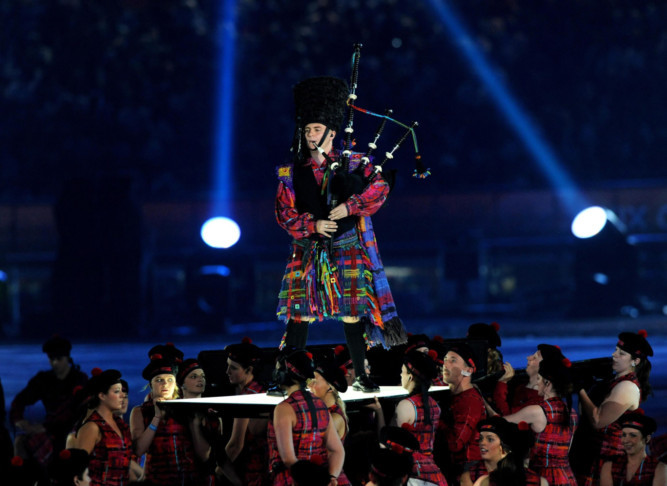
Show-stopping ceremony has set the bar high for a proud city.
Tomorrow, we’ll all have one million chances to be part of the Commonwealth Games.
They’ll take place 12 years after the idea was first floated that Glasgow had both the ambition and the ability to host the event.
In the shadow of last year’s London Olympics and in a time of austerity, some sceptics question the worth of investing so heavily in a sporting event lasting just two weeks.
But Dr Bridget McConnell, who has played a major role in bringing the Games to the city and was in Manchester in 2002 when the original host city discussion took place, insists Glasgow 2014 is a sound investment.
Speaking exclusively to The Sunday Post she said: “Sometimes people think, ‘You have to spend all this money on a two-week event? Well, actually it’s not a two-week event.
“The building of venues, for example, has seen thousands of apprentices get involved. These are young people who have been given a chance to learn a trade and get a job.
“I attended a dinner to recognise the achievements of the apprentices and I asked one of them what he thought he’d got out of working at the Emirates Arena.
“He said: ‘I’ll be able to tell my grandchildren when we walk past that their grandad built that’.
“That summed up the ownership, sense of pride, and the opportunities the Games have and will provide. Those kinds of impacts don’t often get seen.
“Costs will always be an issue, in good times and in bad. When the idea was originally discussed, there had been examples internationally where big events had cost a lot of money and people felt they hadn’t seen a return.
“The Games won’t deliver on every agenda the day after they’re complete, but over a longer period of time and within the context of a bigger strategy, there will be huge benefits.”
Danny Boyle’s Opening Ceremony for the London Olympics captured the imagination of the whole country and set the tone for a sensational summer of sport.
For Dr McConnell the success of the opening of the Glasgow games is the one thing she wants to go without a hitch.
She admitted: “The Opening Ceremony is an opportunity to say: ‘This is the type of city we are, this is the type of country we are, this is the kind of people we are’.
“If the Opening Ceremony is duff, it’s very hard to recover, but it won’t be.
“At the closing of the games in New Delhi we had a seven minute slot as part of the event.
“The following day the Times of India newspaper carried the headline Glasgow Stole The Show. It was stunning and just worked.”
Coming just two years after the London Olympics there were fears during the bidding process that they could undermine Glasgow’s chances of winning the chance to host the Commonwealth Games.
There were also worries the shadow of the 2012 event would loom large over Glasgow, taking some of the gloss away.
Instead, by securing the Games, the city has secured its place as one of the most desirable places in the world to host sporting and cultural events.
Dr McConnell, who has the title of Director of Ceremonies, Culture and Queen’s Baton Relay for Glasgow 2014, said: “There was always a worry that at the bidding stage we wouldn’t get the Games because the Olympics were so close.
“Actually people saw that it was different in terms of scale and an entirely different beast in many ways. We won it because we had the best bid.
“The Olympics have also been a boost in a way we could never have imagined.
“We were hopeful it would give everyone a lift and inspire people to become more engaged in sport.
“But it has been a bigger boost than we imagined and we are very happy we are coming so soon afterwards.”
In 2002 the Manchester games were the spark that started Glasgow’s journey.
Twelve years on our games are within touching distance.
Dr McConnell, whose husband Jack as First Minister was also one of the driving forces behind the bid, explained: “It wasn’t just, ‘If Manchester can do this, so can we’.
“There were so many similarities between the two cities at the time that made it seem like it could be done.
“These events genuinely have a way of bringing people together and showing that there is such a thing as community.
“It’s amazing to say the average price of the tickets to a once-in-a-lifetime opportunity are within everyone’s reach,” Dr McConnell said.
“For all of us who were planning, and it’s seemed like forever, it’s now on our doorstep.”
Tickets to Scotland’s largest ever sporting and cultural event will go on sale tomorrow.
Team Scotland and 70 other nations and territories, including Jamaica, Australia, South Africa, Kenya and New Zealand will compete for medal glory across 11 days of competition.
Around one million tickets will be up for grabs but you don’t have to apply for tickets straight away and can do so at any point over the next four weeks.
Prices start at £15 for adults with half-price concessions for under 16s and the over 60s.
Games organisers have pledged that more than two thirds of the tickets will cost £25 or less. Glasgow 2014 chief executive David Grevemberg said: “Along with the athletes, the city and its people will be stars of the Games, providing a dynamic stage and a friendly welcome for the next big sporting event to come to the UK.”
A copy of the official ticketing guide and an application form is available to download online at glasgow2014.com/tickets

Enjoy the convenience of having The Sunday Post delivered as a digital ePaper straight to your smartphone, tablet or computer.
Subscribe for only £5.49 a month and enjoy all the benefits of the printed paper as a digital replica.
Subscribe